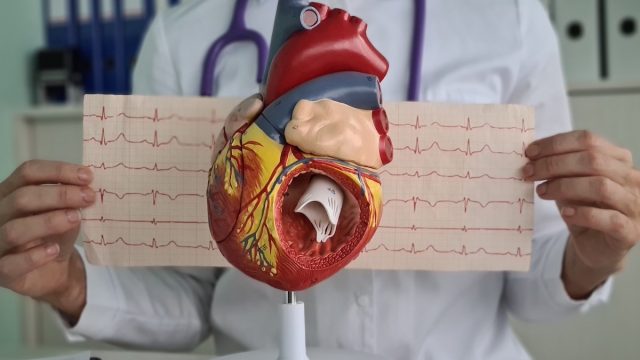Doctors Sound the Alarm on Common Heart Conditions: “Like a Ticking Time Bomb”

The Centers for Disease Control and Prevention (CDC) estimates that nearly half of all U.S. adults have high blood pressure, formally known as hypertension—and 20 percent of those people are unaware that they have it. Atrial fibrillation (or “AFib”), which causes an irregular heart rhythm, affects far fewer Americans—recent estimates put it at about 5 percent—however, doctors are now warning that when someone has both of these cardiovascular conditions, it’s “like a ticking time bomb.”
How are hypertension and atrial fibrillation related?
Called the “silent killer,” hypertension often presents no obvious symptoms and goes undiagnosed. As Mayo Clinic explains, it occurs when the force of the blood pushing against your artery walls is too high, which makes it harder for the heart to pump blood and can lead to heart attack or stroke.
Atrial fibrillation is an irregular heartbeat in which “the heart’s upper chambers—called the atria—beat chaotically and irregularly,” Mayo Clinic notes. “They beat out of sync with the lower heart chambers, called the ventricles.” This may cause a rapid heartbeat, shortness of breath, or lightheadedness and can similarly increase the risk of heart attack, stroke, and blood clots.
A press release notes that AFib “is the most common sustained rhythm disorder,” but since it’s often asymptomatic, it also may go undiagnosed.
But how are these two cardiovascular conditions related?
The new review article, published in the AHA’s journal Circulation, notes that hypertension “is the leading modifiable risk factor for atrial fibrillation” and is present in roughly 70 percent of AFib (AF) cases.
And according to a 2015 study published in the Methodist DeBakey Cardiovascular Journal, hypertension “is associated with a 1.8-fold increase in the risk of developing new-onset AF and a 1.5-fold increase in the risk of progression to permanent AF.”
Why are doctors exceptionally concerned?
The review article includes 29 international experts on the subject, all of whom agree that “simultaneous screening for hypertension and heart arrhythmia could prevent thousands of strokes,” states the press release.
Although both conditions are often undiagnosed, blood pressure screenings are part of a normal health screening, whereas AFib screenings are not.
“We already know that atrial fibrillation increases the risk of stroke fivefold, but there is also growing evidence linking it to dementia, making its early detection even more important,” said Teemu Niiranen, MD, PhD, a professor at Finland’s University of Turku and a leading expert on hypertension.
“The combination of high blood pressure and atrial fibrillation is like a ticking time bomb,” he continued.
Ways to check for atrial fibrillation:
“A simple pulse check or an automatic alert of an irregular heart rate on a blood pressure monitor could mean the difference between early treatment and a life-altering stroke,” concluded Niiranen. “By incorporating atrial fibrillation screening to routine blood pressure screenings, we could identify at-risk patients earlier, start appropriate treatment, and save lives.”
He and the other experts recommend three “simple” ways to detect AFib, according to the press release:
- A 30-second pulse check from the wrist or neck to detect an irregular heartbeat
- Blood pressure monitors with irregular heartbeat alerts (some of these already exist)
- Small, portable ECG monitors or smartwatches that detect atrial fibrillation in under a minute
The takeaway:
Seventy percent of people with atrial fibrillation—the most common heart rhythm disorder—also have hypertension. However, AFib is not checked like blood pressure, and doctors warn this combination “is like a ticking time bomb.” Therefore, they recommend routine atrial fibrillation screenings that could reduce the risks of heart attack and stroke.